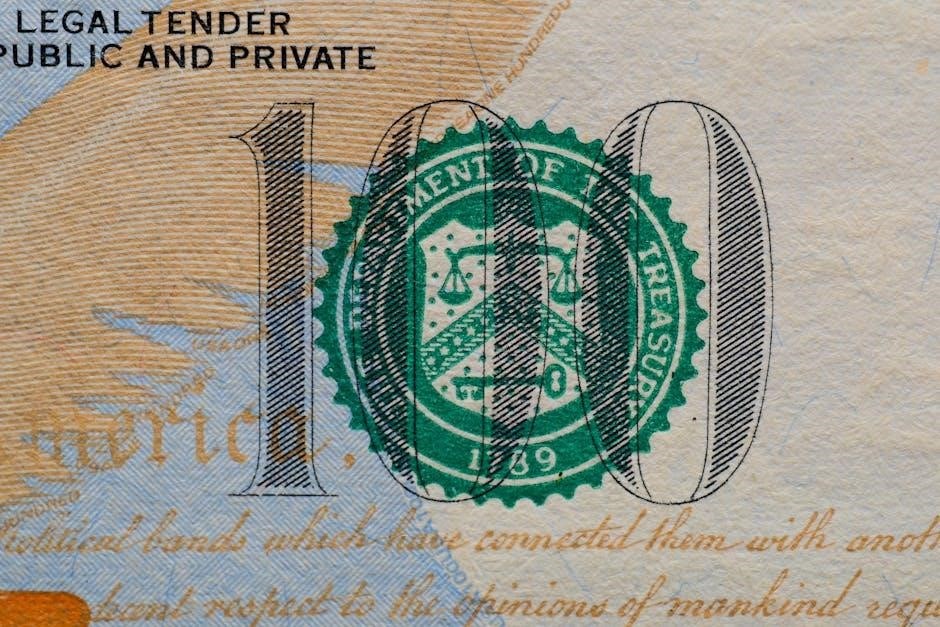The Bill of Complaint for Divorce in Virginia initiates legal proceedings, outlining grounds for divorce, marital history, and relief sought. It must be filed with the Circuit Court, accompanied by required forms like the Certificate of Grounds (CC-1406) and, if applicable, a Petition for No-Fault Divorce (CC-1421). Accuracy and completeness are crucial to ensure proper processing and avoid delays.
Overview of the Document
The Bill of Complaint for Divorce in Virginia is a legal document initiating divorce proceedings. It outlines the grounds for divorce, such as irretrievable breakdown or fault-based reasons, and provides essential details about the marriage, including dates, residences, and children. The document must be filed with the Circuit Court and served to the spouse. Accompanying forms like the Certificate of Grounds (CC-1406) and the Petition for No-Fault Divorce (CC-1421) may be required. Accuracy is crucial, as errors can delay the process. This document formally starts the legal separation process, making it a cornerstone of Virginia divorce proceedings. Proper completion ensures compliance with state laws and court requirements.
Importance in the Divorce Process
The Bill of Complaint for Divorce is a critical document in Virginia divorce proceedings, as it formally initiates the legal process. It provides the court with essential details about the marriage, grounds for divorce, and requested relief, such as custody or property division. Accuracy and completeness are vital, as errors can lead to delays or legal complications. This document sets the tone for the entire case, ensuring compliance with Virginia’s legal requirements. Properly filed, it allows the court to review and rule on the divorce, making it a foundational step in achieving a final decree. Its importance cannot be overstated, as it establishes the framework for resolving all marital issues.

Filing Process for Divorce in Virginia
Filing for divorce in Virginia involves submitting the Bill of Complaint and required documents to the Circuit Court. Ensure compliance with local rules to avoid delays.
Where to File: Circuit Court
In Virginia, divorce proceedings are filed in the Circuit Court of the county or city where the defendant resides. If both parties agree, you can also file in the county or city where the plaintiff resides. The Circuit Court has jurisdiction over divorce cases and is the appropriate venue for submitting the Bill of Complaint and related documents. There are 31 judicial circuits in Virginia, each serving specific counties or cities. To determine the correct Circuit Court, identify where the defendant currently resides. Contact the local Circuit Court Clerk’s office for specific filing requirements and to confirm jurisdiction. The Clerk’s office also provides access to necessary forms and guidance on the filing process.
Required Documents: Complaint and Certificate of Grounds
Filing for divorce in Virginia requires specific legal documents, starting with the Bill of Complaint for Divorce. This document outlines the grounds for divorce, marital history, and relief sought. Additionally, a Certificate of Grounds (Form CC-1406) must be submitted, confirming the legal basis for the divorce. For no-fault divorces, a Petition for No-Fault Divorce (Form CC-1421) is also necessary. These forms are available on the Virginia Judicial System website or through local Circuit Court Clerks. Properly completed and notarized documents ensure the divorce process proceeds smoothly. Failure to include required information, such as separation dates or grounds, may delay processing. Always verify document requirements with the court to avoid errors.
Serving the Papers
Serving the divorce papers is a critical step in the Virginia divorce process. Once the Complaint is filed, it must be delivered to the spouse, ensuring they are formally notified. Methods include personal service by a sheriff or process server, certified mail with a return receipt, or publication if the spouse’s location is unknown. Proof of service must be filed with the court to confirm delivery. Failure to properly serve the papers can delay the divorce proceedings. The spouse has 21 days to respond from the date of service. If served outside Virginia, the response period extends to 30 days. Proper service ensures the legal process moves forward effectively and fairly for both parties involved.
Types of Divorce in Virginia
In Virginia, divorces are categorized as no-fault or contested. No-fault divorces are based on irretrievable breakdown, while contested divorces involve disputes over issues like property or custody.
No-Fault Divorce
In Virginia, a no-fault divorce is based on the irretrievable breakdown of the marriage, requiring no proof of wrongdoing. To qualify, couples must live separately for six months (or one year with minor children) and execute a written separation agreement. This approach avoids contentious disputes, making the process less adversarial. The Bill of Complaint for Divorce must state the grounds under Virginia Code § 20-91(A)(9), confirming the marriage’s irretrievable breakdown. Filing Form CC-1421, the Petition for No-Fault Divorce, is required. This streamlined process is ideal for amicable separations, allowing couples to finalize the divorce without court battles over fault or misconduct.
Contested Divorce
A contested divorce occurs when both parties do not agree on the terms of the divorce, such as property division, child custody, or spousal support. In Virginia, the Bill of Complaint for Divorce must detail the grounds for dissolution and outline the contested issues. The court will schedule a trial to resolve disputes, requiring each party to present evidence and testimony. The process is more time-consuming and costly compared to no-fault or uncontested cases. Legal representation is highly recommended due to the complexity and adversarial nature of contested proceedings. The court will issue a final decree after all disputes are resolved, ensuring a fair and lawful outcome for both parties.
Residency Requirements
In Virginia, at least one party must be a resident for six months before filing for divorce. If grounds occurred within Virginia, residency is immediate.
Eligibility Criteria
To file for divorce in Virginia, at least one party must meet residency requirements. The spouse filing must have lived in Virginia for six months, proving residency through documentation like driver’s license or lease. If the grounds for divorce occurred within Virginia, residency can be established immediately. Military personnel stationed in Virginia qualify as residents. The court verifies residency to ensure jurisdiction. Proper residency ensures the divorce is legally valid. This criterion applies to both no-fault and fault-based divorces. Meeting residency requirements is essential for proceeding with the divorce process in Virginia courts. Proper documentation is crucial to avoid delays or dismissal of the case.

Grounds for Divorce
Grounds for divorce in Virginia include no-fault options like irretrievable breakdown and living separately for one year. Fault-based grounds involve adultery, cruelty, or desertion, requiring proof in court.
No-Fault Grounds: Irretrievable Breakdown
In Virginia, a no-fault divorce based on irretrievable breakdown requires spouses to live separately for at least one year without cohabitation. This ground eliminates the need to prove fault, focusing instead on the permanent end of the marriage. To qualify, the separation must be continuous, with no intent to reconcile. The Bill of Complaint must state that the marriage is irreparably broken, and both parties must agree or the court must confirm the breakdown. This approach simplifies the process, avoiding contentious disputes, and is often preferred for its efficiency and reduced conflict in uncontested cases.
Fault-Based Grounds
Fault-based divorce in Virginia requires proving specific grounds, such as adultery, cruelty, or desertion. Adultery involves voluntary sexual intercourse with someone other than the spouse. Cruelty refers to abusive physical or mental treatment endangering health. Desertion involves abandonment for at least one year without intent to return. Other grounds include felony conviction with imprisonment and sodomy or buggery outside marriage. The plaintiff must provide evidence to support these claims, which can involve testimony or documentation. Fault-based divorces are often more complex and contentious than no-fault cases, as they require proving wrongdoing. This approach may be necessary for immediate divorce or to address specific legal or financial consequences tied to the spouse’s actions.

Legal Forms and Documents
Key documents include Form CC-1406 (Certificate of Grounds) and CC-1421 (Petition for No-Fault Divorce). These forms are essential for initiating and processing divorce cases in Virginia courts.
Form CC-1406: Certificate of Grounds
Form CC-1406, the Certificate of Grounds, is a critical document required for filing a divorce in Virginia. It verifies the legal basis for the divorce, ensuring compliance with state laws. Available on the Virginia Judicial System website, this form must be completed accurately and submitted alongside the Complaint for Divorce. It provides essential details about the marriage, separation, and grounds for divorce, such as irretrievable breakdown or fault-based reasons. Proper completion of this form ensures the court can process the divorce case efficiently. Failure to include this document may result in delays or dismissal of the case. It is a mandatory step in Virginia’s divorce proceedings.
Form CC-1421: Petition for No-Fault Divorce
Form CC-1421 is the official document for initiating a no-fault divorce in Virginia, available on the Virginia Judicial System website. This form is specifically designed for cases where both parties agree to the divorce, citing an irretrievable breakdown of the marriage. It streamlines the process by eliminating the need to prove fault. The petition must include details such as the marriage date, separation date, and confirmation of residency requirements. Once completed, it is filed with the Circuit Court alongside other necessary documents. This form ensures compliance with Virginia’s legal standards for no-fault divorces, facilitating a smoother and more efficient dissolution of marriage process.
Costs and Fees
Filing fees for divorce in Virginia vary by court but typically range between $80 to $100. Additional costs may include service fees for delivering papers to your spouse.
Filing Fees
Filing fees for a divorce in Virginia typically range between $80 to $100, depending on the circuit court. These fees cover the cost of initiating the divorce process and are non-refundable. Payment methods accepted by the court may include cash, check, or credit cards, though this varies by location. Additional fees may apply for services such as document certification or expedited processing. It’s important to verify the exact filing fee with the local Circuit Court Clerk’s office before submitting your Bill of Complaint. Some courts may also offer fee waivers for individuals who meet specific indigency criteria, which can be determined through a separate application process.
Additional Costs
Beyond the initial filing fee, additional costs may arise during a Virginia divorce. Service of process fees, typically $12-$25, are required to deliver divorce papers to the spouse. If mediation is needed, fees range from $200 to $500. Attorney fees vary widely, depending on case complexity and location, potentially exceeding $10,000 for contested cases. Other expenses may include document preparation, court-appointed experts, or custody evaluations. These costs accumulate and can significantly increase the overall expense of the divorce process. It’s important to budget for these potential additional fees when planning for your divorce in Virginia. Consulting with a legal professional can provide clarity on expected costs.
Witnesses and Evidence
In contested divorces, witnesses and evidence are crucial to support claims. Testimony from spouses, family, or experts may be required. Evidence like financial records or communications can be submitted to substantiate allegations or disputes.
Role in Contested Divorces
In contested divorces, witnesses and evidence play a critical role in supporting or refuting claims made by either party. Witnesses may include spouses, family members, or experts who can provide testimony relevant to the case. Evidence such as financial records, communication logs, or property documents can be submitted to substantiate allegations or disputes. The court relies on this information to make informed decisions regarding issues like property division, spousal support, or custody arrangements. Properly presenting witnesses and evidence is essential for ensuring that each party’s rights and interests are fairly represented during the legal proceedings.
Obtaining Forms
The necessary divorce forms, including the Bill of Complaint and supporting documents, can be obtained from the Virginia Judicial System website or local Circuit Court Clerks. These forms are readily available for download or in-person pickup, ensuring easy access for individuals initiating the divorce process.
Virginia Judicial System Website
The Virginia Judicial System website provides easy access to essential divorce forms, including the Bill of Complaint and supporting documents. Visitors can download forms like the Certificate of Grounds (CC-1406) and the Petition for No-Fault Divorce (CC-1421). These forms are available in PDF format and can be filled out electronically or printed for manual completion. The website also offers guides and instructions to help individuals navigate the divorce process. By visiting the official Virginia Courts website, individuals can ensure they are using the most up-to-date and accurate forms required for filing. This resource is crucial for anyone initiating or responding to a divorce proceeding in Virginia.
Local Circuit Court Clerks
Local Circuit Court Clerks play a crucial role in assisting individuals with divorce proceedings. They provide access to necessary forms, including the Bill of Complaint for Divorce, and ensure compliance with legal requirements. Clerks review filings for completeness and accept the required documents for processing. While they cannot offer legal advice, they can guide applicants through procedural steps. Forms such as the Certificate of Grounds (CC-1406) and the Petition for No-Fault Divorce (CC-1421) are often available through their offices or the Virginia Judicial System website. Applicants must ensure accuracy in their submissions to avoid delays in the divorce process.

Drafting the Complaint
Drafting the complaint requires including essential information such as marital history, grounds for divorce, and relief sought. Ensure accuracy and proper notarization before filing with the Circuit Court.
Essential Information to Include
The complaint must include the names and addresses of both parties, grounds for divorce under Virginia Code § 20-91, and a statement of marital history. Specify whether the marriage is contested or uncontested, and list any minor children. Detail property ownership, assets, and liabilities. If seeking spousal support or child custody, outline the request clearly. Attach a completed Certificate of Grounds (CC-1406) and, for no-fault cases, a Petition for No-Fault Divorce (CC-1421). Ensure all claims are accurate and supported by evidence. Proper notarization is required for all affidavits and supporting documents to validate the complaint.

Final Divorce Decree
The Final Divorce Decree is the official court document ending the marriage, outlining property division, custody, and support arrangements. It is legally binding and finalizes all marital issues.
Processing and Finalization
After filing the Bill of Complaint for Divorce, the court processes the document, ensuring all legal requirements are met. The Clerk’s Office records the complaint and manages the case. Once all issues are resolved, the court enters a Final Divorce Decree, legally ending the marriage. This decree is prepared by the petitioner or their attorney, submitted for judicial review, and signed by the judge. It is then recorded by the Clerk, becoming a public record. The finalization process ensures all agreements, such as property division and custody arrangements, are legally binding. The Clerk provides certified copies for official purposes, completing the divorce process.

Legal Assistance
Seeking legal assistance is crucial for navigating Virginia’s divorce process. Attorneys can provide guidance on filing the Bill of Complaint and ensure compliance with state laws, protecting your rights and streamlining the legal proceedings.
Options for Legal Help
When navigating a divorce in Virginia, seeking legal assistance is essential. Options include consulting a family law attorney, who can guide you through the process and ensure proper filing of the Bill of Complaint. Legal aid organizations may provide free or low-cost services for eligible individuals; Additionally, self-representation is possible, but it requires careful adherence to legal procedures. Online resources, such as the Virginia Judicial System website, offer downloadable forms and instructions to help you understand the process. Regardless of the path chosen, legal assistance ensures your rights are protected and the divorce process is handled efficiently.
The Bill of Complaint for Divorce in Virginia is a critical document initiating divorce proceedings. Properly understanding and preparing it ensures compliance with state laws and smooth processing.
The Bill of Complaint for Divorce in Virginia is a foundational document initiating divorce proceedings. It outlines the grounds for divorce, marital history, and requested relief. Proper preparation ensures compliance with Virginia law. The Complaint must be filed with the Circuit Court, accompanied by forms like the Certificate of Grounds (CC-1406) and, if applicable, a Petition for No-Fault Divorce (CC-1421). Accuracy in detailing separation dates, property agreements, and custody arrangements is crucial. The court processes the Complaint, ensuring all legal requirements are met. Timely and correct submission of documents avoids delays. Consulting legal resources or professionals is recommended for complex cases. Understanding the process ensures a smooth transition to the final divorce decree.